Why DAOs matter so much to Swae’s Mission
[And what is the future of DAO Governance?]
6 min read July 2022
The backstory to Swae’s pivot towards DAOs
by Soushiant Zanganehpour @Soushiant
Wait, what the heck is a DAO?
Imagine a group of people who collectively own a bank account and make group decisions about how to use the funds inside – That’s the simplest way to explain a DAO.
A decentralized autonomous organization (or “DAO” as they are called) is a new type of organization, similar in nature to a cooperative, where all the members have the right to participate in important decisions based on their ownership percentage (expressed in the amount of tokens they hold) in the DAO.
DAOs differ from a traditional enterprise because they don’t have a formal hierarchy or leadership layer. There is always a core team that creates a DAO but, when the DAO is up and running it is structurally, and legally designed to be flat, to allow all token holding members to create proposals, vote and debate ideas, and participate in decision-making.
Rather than being governed by a limited group, DAOs use a set of rules written down in code which are enforced by “smart contracts” and a network of computers running a shared software linked to a blockchain. This offers members a built-in model for the collective management of a DAOs code and assets.
To ensure fairness, voting power is distributed proportionally to the amount of tokens each member holds- there’s no central actor who can affect the DAO’s decisions, spending or outcomes. There is no single point of control, and no single point of failure- that’s true decentralization.
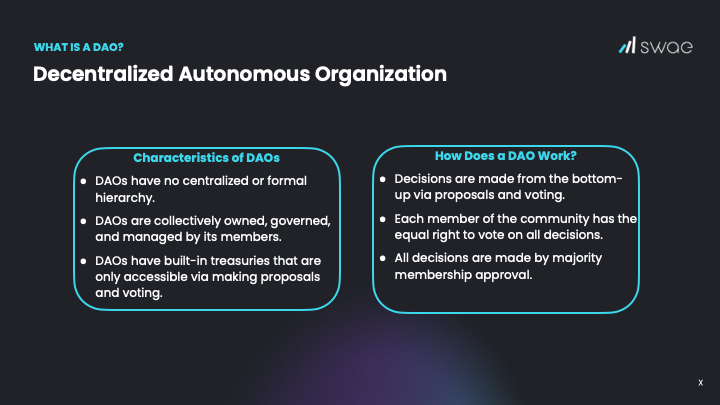
How important are DAOs? 📈
Simply put, DAOs are the future of new communities in the Web3/Crypto ecosystem.
Despite the issues in today’s financial markets, DAOs have been growing at an unprecedented rate, going from $0 in 2020 to $13B Market Cap in under 2 years.
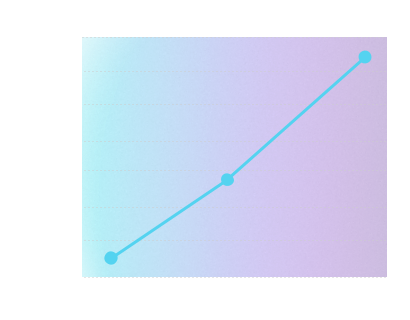
$13 Billion
Currently (July ‘22) there are…
4834
Active DAOs
56.6k
Decisions made
1.7 Million
Governance Tokens Held
662k
Decisions, decisions
Ok, but what do DAOs have to do with Swae? 🤝
DAOs are the ripest testing grounds for bottom-up decision making.
Swae was founded to give everyone inside an organization an equal voice in raising solutions and shaping decisions – an experience that is foreign inside most traditional organizations.
DAOs exist to make important decisions in a collective manner, automatically giving participatory powers to asset holding members of the DAO.
Nowhere do we see a greater opportunity for Swae’s ambitions and vision to be realized than within the world of Web3 with the explosive growth and mainstreaming of DAOs.
Inclusion, transparency and accountability are critical features to how a DAO functions and is governed.
These principles are built into the organization’s DNA and they closely resemble what Swae has digitized with its software to help organizations make collective decisions.
the challenge
The challenges of implementing bottom-up decision-making in corporate environments 🤌
Swae has proven that there is tremendous unrealized value to harness for any organization, simply from tapping into the collective intelligence from within.
Working with various types and sizes of client, we now know that creating an immersive and permissionless space for debate and bottom-up solutions allows any organization to stay on top of issues and air out tensions. This helps keep employees’ morale high, engagement booming, and the number of high quality creative solutions to existing problems flowing, ultimately impacting financial performance.
To highlight a couple of examples:
⦿ Lifelabs found over $200k in operational savings in less than 30 days all because the Swae methodology included people that were normally not part of a decision making process to contribute creative solutions to a very tricky operational problem.
⦿ The Swae process has also helped much larger organizations like the United Nations crowdsource over 750 strategy suggestions in less than 3 weeks to help them publish a fresh and diverse strategic plan for the next several decades of their existence – ideas that were cultivated from those that typically don’t have a voice at the decision making table.
These implementations have proven that a bottom-up system of sourcing decisions can be as good as the current top-down processes that dominate most organizations. At a minimum, it shows that the immersive and bottom-up process that Swae enables can live side-by-side with top down processes, complementing what is in place, ensuring those who are traditionally left out (due to language capabilities, time, or access to networks or clout) have a chance at participating and shaping decisions, so their unrevealed insights may ultimately benefit the organizations that employ or are responsible for them.
Despite all the positive outcomes from Swae, pilot after pilot also helped clarify how reluctant, apprehensive, and concerned most existing leaders are in traditional enterprises about creating too much inclusion in their workforce – worrying about the consequences of too many voices being aired on potentially sensitive topics without significantly controlling the conversations.
Swae is too big of a cultural leap forward for many corporations (for now).
Despite the resistance, DAOs have been openly embracing and loving what we have built with Swae. The also represent a much more culturally aligned type of organization that urgently needs Swae to support more efficient management of decision-making and governance issues.
the future of decision making
DAOs + Swae ❤️
DAOs currently face a lot of problems with collective decision making. The combination of Web2 and Web3 tools they use are not specifically designed to help coordinate decision-making within their communities. Currently in most DAOs, there isn’t a standard or streamlined way for DAOs to actively track ideas, conversations, proposals, and votes on a single platform.
Most DAOs use use a combination of communication and offline voting tools like a Discord, Telegram, Discourse, and Snapshot.
These lead to a lot of manual idea tracking and movement from one platform to another. DAO users get overwhelmed, spend too much time digging through threads to stay updated, and become disengaged, weakening DAOs who lose talent, ideas, and resources.
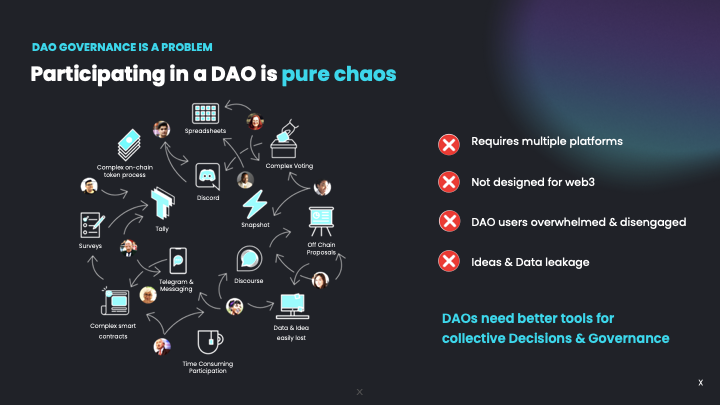
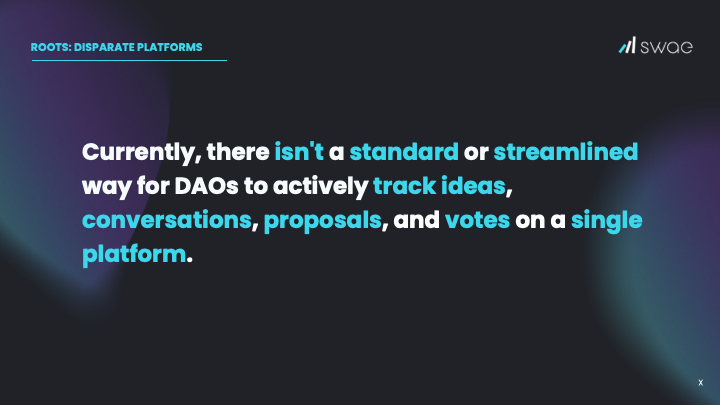
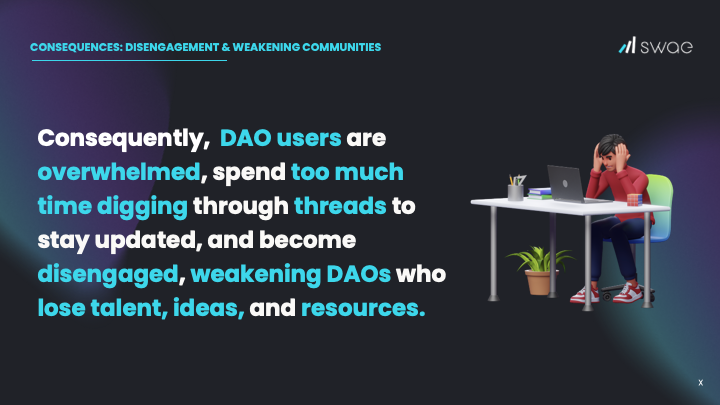
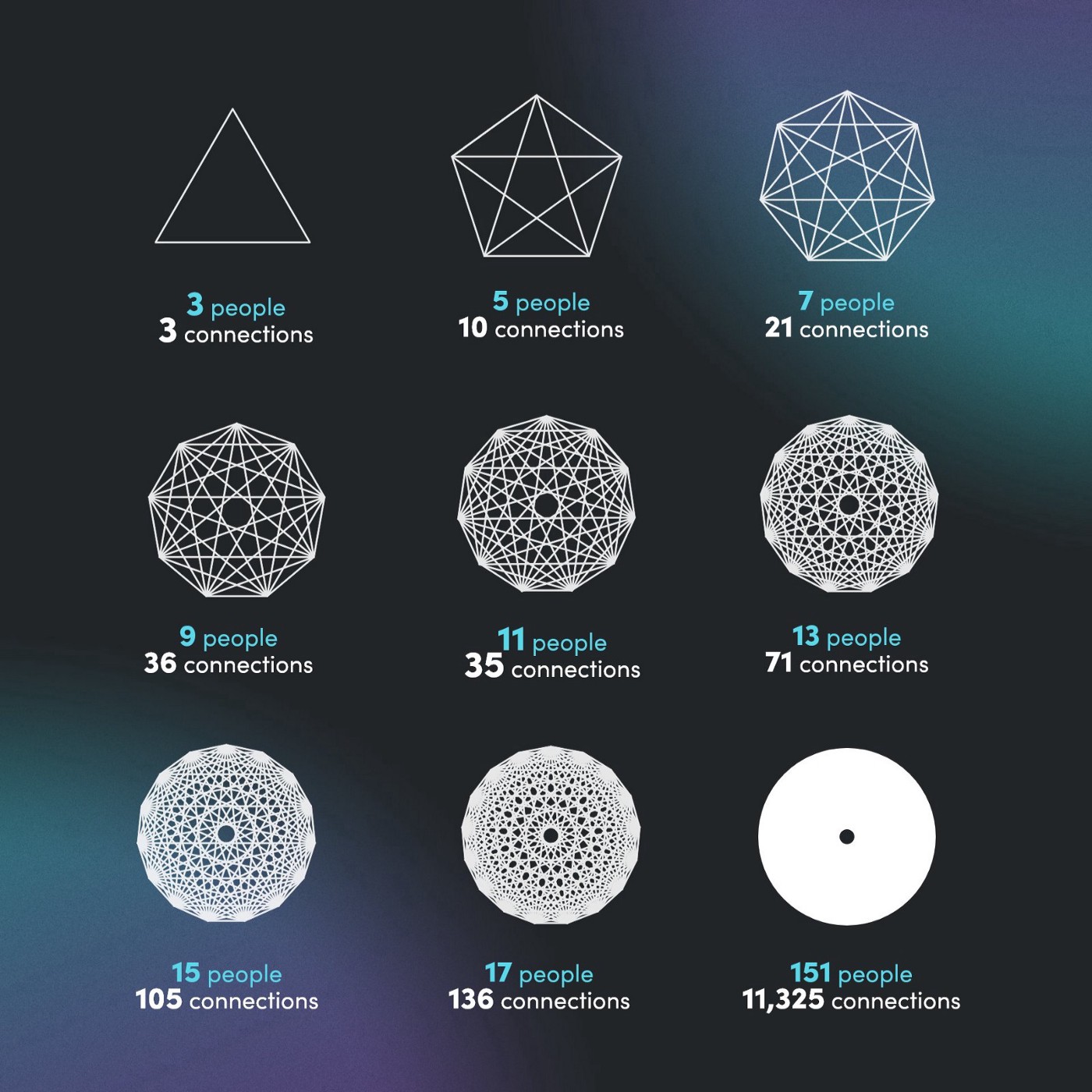
Swae provides DAOs with an all-in-one, collective decision-making and governance platform that helping DAOs simplify the collection and prioritization of decisions within their communities.
Swae’s platform and proposal development system can significantly improve the inefficiencies and poor user experience associated with raising, deliberating, and voting on proposals using standalone tools (like Discord, Telegram, Forums and the like), that were never intended to be end-to-end decision making and governance platforms.
Swae’s features help DAOs coordinate their members to raise polls, create and collaborate on proposals, collectively improve them through a structured debate, and vote on them all in one place. This helps DAOs avoid needing several platforms they currently use (like Discord, Discourse, Snapshot/Tally), and can thrive with just one tool (not 10).
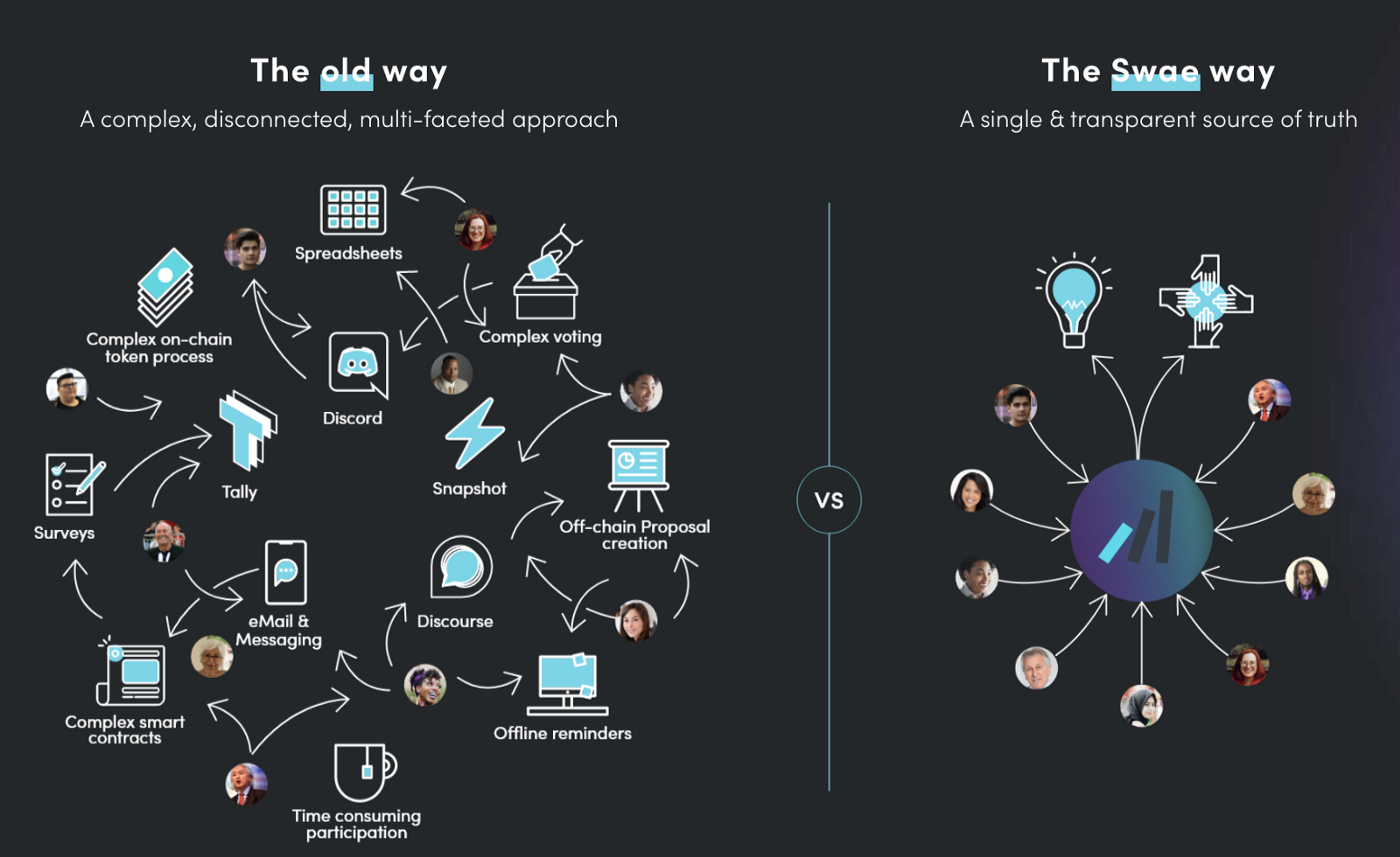
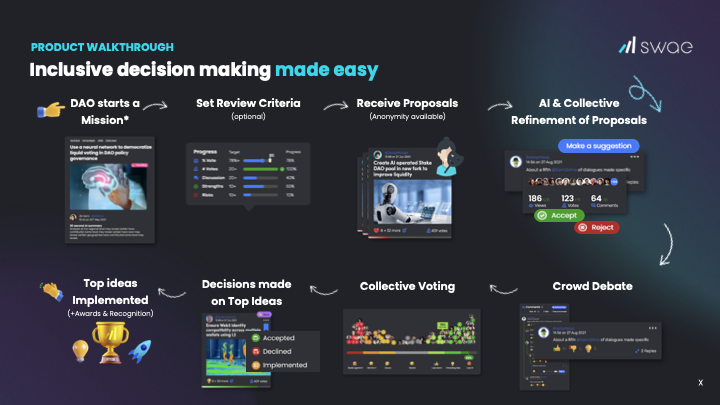

Decentralized decision making made easy

Swae is the all-in-one decision making and governance tool empowering the next generation of Web3 DAO communities
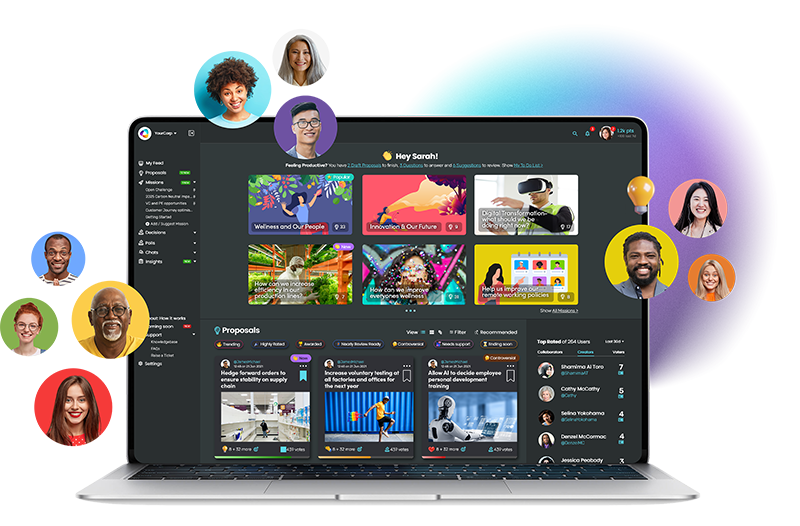
Customer success stories
DAOs using Swae ⚒️
While Swae started out as an idea management platform for large enterprises and smart cities, and since the product has been sector agnostic, DAOs have found the platform and feature set to be a real source of pain relief from using makeshift tools in managing, tracking and actionizing ideas in a collective environment.
So far we have been great results and currently have 3 DAOs already using Swae.
Most recently, we’ve been working with Decentralized Autonomous Organizations, to help them allocate investments and select grant projects through a community-driven and vetted voting and selection process. Swae helped DAO SingularityNet select 12 novel projects and allocate $1M worth of Grants towards them, and OpenExo to allocate over $3M worth of funding to 40 community-driven projects using Swae (learn more from Swae’s Case Studies).
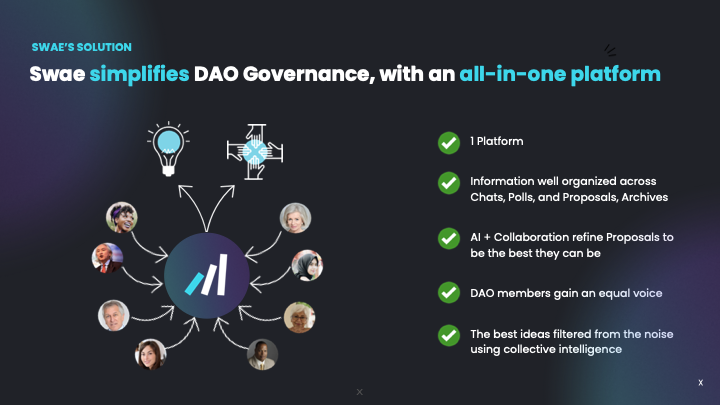
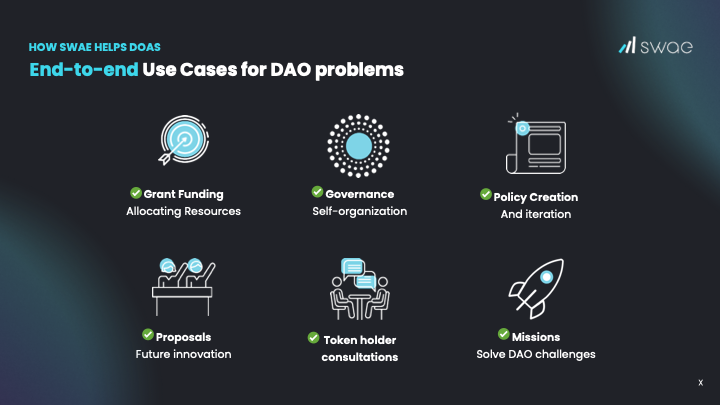
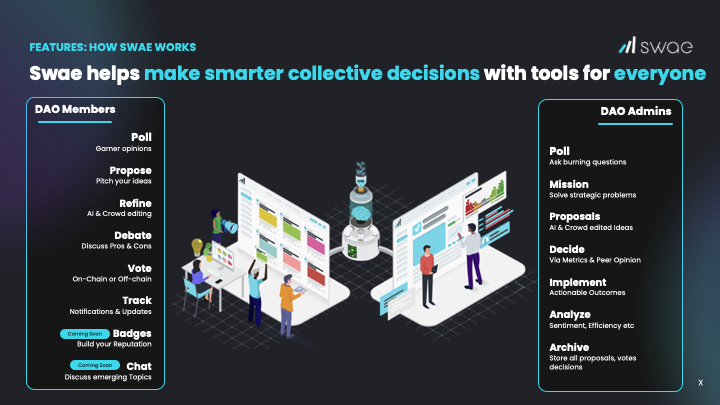
Future scenario
Future Implications – What happens if DAOs succeed? 🌐
Whatever direction the world goes in and we head towards, we must all accept that our current systems for decision-making are less and less fitted for our communication and cultural era. We need new structures, processes and improved participation methods in order to create new solutions that prioritize and give political weight to ideas that advance community needs, over the narrow interests of the privileged few at the top.
If DAOs are successful in coordinating decisions and actions amongst disparate groups of people efficiently, they can have a very disruptive impact on traditional organizations and legal models.
Whatever the future holds, DAOs present the right opportunity to prove that a bottom-up decision making process is not only possible but useful and valuable, and we’re absolutely thrilled to support these experiments using Swae.
Venturing deeper into the DAO space will be our next big technological evolution of the product.
We’re so excited. 🚀
Watch this space!
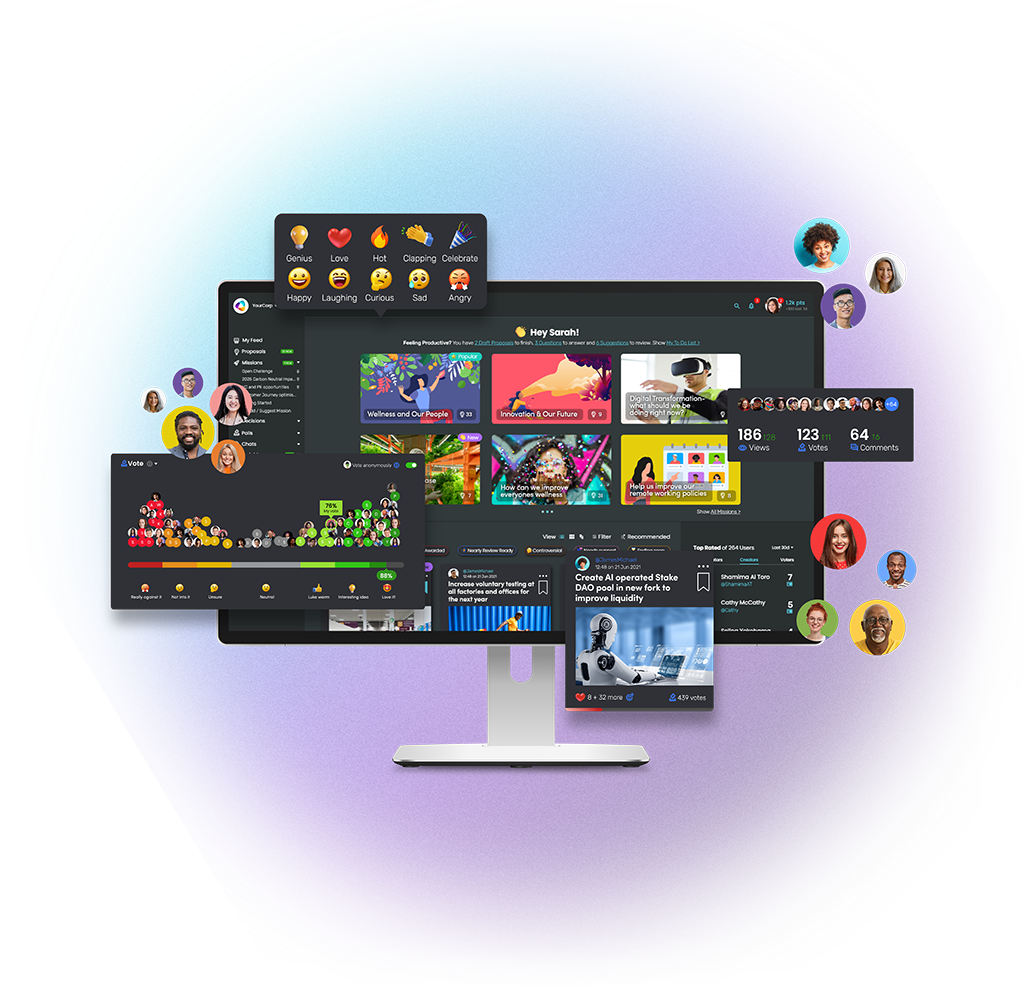
More to explore…
How To Solve Organizational Challenges and Manage Ideas
We’re helping solve the challenges that organizations face today by simplifying how ideas are managed. Introducing Swae’s most recent product update that addresses the complexity of how organizations manage the many challenges and campaigns necessary to make progress...
3 Ways to Improve COVID-19 Relief Programs for the Startup Sector
Part 2 of 2: We Must Protect the Years of Investment Made to Creating a Strong ICT Sector in CanadaSuggested proposals for Improving CEWS and other relief programs Based on part one in this series, we reviewed the fundamental issues with COVID-19 crisis relief...
Why There’s a Fundamental Issue with the COVID-19 Crisis Relief Programs
After assessing the various programs offered to companies affected by COVID-19, our research has found that most companies are unable to benefit from a variety of relief programs offered by the government.
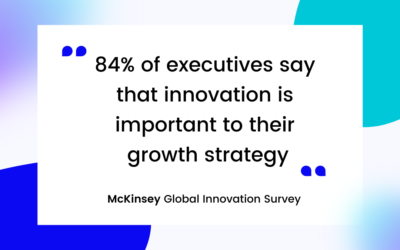
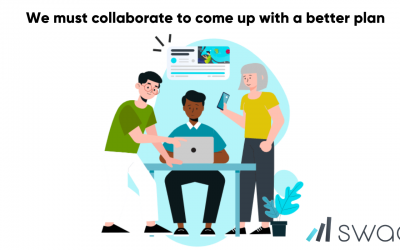
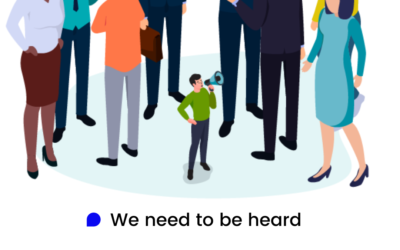
I am an investor of gate io, I have consulted a lot of information, I hope to upgrade my investment strategy with a new model. Your article creation ideas have given me a lot of inspiration, but I still have some doubts. I wonder if you can help me? Thanks.
Your article helped me a lot, is there any more related content? Thanks! https://accounts.binance.com/cs/register?ref=JHQQKNKN
Can you be more specific about the content of your article? After reading it, I still have some doubts. Hope you can help me. https://accounts.binance.com/ru/register?ref=FIHEGIZ8
Can you be more specific about the content of your article? After reading it, I still have some doubts. Hope you can help me. https://www.binance.com/bg/register?ref=S5H7X3LP
I am a student of BAK College. The recent paper competition gave me a lot of headaches, and I checked a lot of information. Finally, after reading your article, it suddenly dawned on me that I can still have such an idea. grateful. But I still have some questions, hope you can help me.
Can you be more specific about the content of your enticle? After reading it, I still have some doubts. Hope you can help me.
Les meilleurs casinos en ligne avec crypto-monnaie Ripple XRP sur Internet. Les bonus de bienvenue les plus attractifs et les bonus sans dépôt. Un site à surveiller et à connaître.
Your article helped me a lot, I read the whole thing. I invest in Bitget and I’m very happy you can even get 9000 USDT for inviting a friend.
Gate io Sign up now and get a gift package for beginners. Get $5,500 with a successful registration. Invite new users to receive rewards. Share with your friends 40 % rewards and commission discounts. Get $30 reward on your first deposit. Get $30 reward on your first deposit:
适合世界各地用户的最佳在线赌场。 最好的老虎机、桌面游戏、二十一点轮盘赌等等。 该赌场有很多正面评价,并且也接受加密货币。
Can you be more specific about the content of your article? After reading it, I still have some doubts. Hope you can help me. https://accounts.binance.com/lv/register?ref=53551167
تستخدم القوى العاملة الماهرة في المصنع تقنيات تصنيع متقدمة لإنتاج تجهيزات تتوافق مع المعايير والمواصفات الدولية. إيليت بايب Elite Pipe
When it comes to uPVC pipes, Elitepipe Plastic Factory sets the bar high with their precision-engineered products that provide reliable and leak-free plumbing and irrigation solutions. Elitepipe Plastic Factory
تشتهر تجهيزات HDPE من إيليت بايب Elite Pipe بتعدد استخداماتها ، مما يسمح بوصلات آمنة وفعالة في تطبيقات متنوعة مثل إمدادات المياه وتوزيع الغاز وخطوط الأنابيب الصناعية.
The Elitepipe Plastic Factory in Iraq serves as a catalyst for infrastructure development, providing the market with superior HDPE, uPVC pipes, and fittings that contribute to the growth and success of various sectors. Elitepipe Plastic Factory
يمكن للعملاء الاعتماد على الخبرة الفنية لمصنع إيليت بايب Elite Pipeودعم العملاء المخصص لمساعدتهم في اختيار التركيبات الأنسب لاحتياجاتهم الخاصة.
Elitepipe Plastic Factory’s fittings are designed to be user-friendly, facilitating easy installation and ensuring hassle-free maintenance throughout their lifespan. Elitepipe Plastic Factory
The Elitepipe Plastic Factory’s manufacturing facilities are equipped with state-of-the-art machinery, enabling efficient production processes and consistent product quality. Elitepipe Plastic Factory
fantastic website Lots of useful information here. I’m sharing it on Delicious and forwarding it to a few friends. Of course, I appreciate your sweat as well.
토토사이트
I am currently writing a paper and a bug appeared in the paper. I found what I wanted from your article. Thank you very much. Your article gave me a lot of inspiration. But hope you can explain your point in more detail because I have some questions, thank you. 20bet
I was able to find good info from your content.
Its like you read my mind!
Like!! I blog quite often and I genuinely thank you for your information. The article has truly peaked my interest.
Simply a smiling visitant here to share the love (:, btw great design and style.
Good info. Lucky me I came across your website by accident.
That is a really good tip especially to those new to the blogosphere.
I was able to find good info from your articles.
This is a topic which is near to my heart… Cheers! Where are your contact details though?
I was more than happy to search out this website.
I agree the media is hyping it up. I’m all for survival of the fittest.
This site certainly has all of the information I needed concerning this subject and didn’t know who to ask.
After I originally commented I seem to have clicked on the -Notify me when new comments are added- 토토사이트 checkbox and from now on each time
a comment is added I get 4 emails with the same comment. There
has to be an easy method you are able to remove me from that
service? Thank you!
Thank you very much for sharing, I learned a lot from your article. Very cool. Thanks. nimabi
CS2 Skin Trading Sites, Buy Sell CS Skins Instantly https://daddygambler.com/en/skin-trading-sites/instant-sell/
nagie dziewczyny na kamerkach na żywo https://en.nikitacams.com
SightCare supports overall eye health, enhances vision, and protects against oxidative stress. Take control of your eye health and enjoy the benefits of clear and vibrant eyesight with Sight Care. https://sightcarebuynow.us/
Sight Care is a natural supplement designed to improve eyesight and reduce dark blindness. With its potent blend of ingredients. https://sightcarebuynow.us/
Your point of view caught my eye and was very interesting. Thanks. I have a question for you. https://www.binance.info/kz/join?ref=FIHEGIZ8
Thanks for sharing. I read many of your blog posts, cool, your blog is very good. https://www.binance.info/fr/join?ref=UM6SMJM3
how to index backlink ? watch this
Normally I do not read article on blogs however I would like to say that this writeup very forced me to try and do so Your writing style has been amazed me Thanks quite great post
Somebody essentially lend a hand to make significantly articles Id state That is the very first time I frequented your website page and up to now I surprised with the research you made to make this actual submit amazing Wonderful task
Элвис Пресли, безусловно, один из наиболее влиятельных музыкантов в истории. Родившийся в 1935 году, он стал иконой рок-н-ролла благодаря своему харизматичному стилю и неповторимому голосу. Его лучшие песни, такие как “Can’t Help Falling in Love”, “Suspicious Minds” и “Jailhouse Rock”, стали классикой жанра и продолжают восхищать поклонников по всему миру. Пресли также известен своими выдающимися выступлениями и актёрским талантом, что сделало его легендой не только в музыке, но и в кинематографе. Его наследие остается живым и вдохновляет новые поколения артистов. Скачать музыку 2024 года и слушать онлайн бесплатно mp3.
I’ve engaged with the content of this article, but I find myself drawn to alternative interpretations of the subject matter.
Wow amazing blog layout How long have you been blogging for you made blogging look easy The overall look of your web site is magnificent as well as the content
The practical advice in this post is going to be a game-changer for me.
upysm.com 是一個專業的社交媒體推廣平台,提供各種刷粉絲服務,讓您的Instagram、Facebook、Youtube等帳號快速增加人氣和影響力。無論您是個人創作者還是企業品牌,我們都可以為您量身定制最合適的方案,讓您在社交媒體上脫穎而出。
Magnificent beat I would like to apprentice while you amend your site how can i subscribe for a blog web site The account helped me a acceptable deal I had been a little bit acquainted of this your broadcast offered bright clear idea
http://rabotaref.forum-top.ru/viewtopic.php?id=3273#p6737
http://cinemania.forum24.ru/?1-15-0-00000794-000-0-0-1706616226
https://may-green.ru/forum/user/13265/
https://www.izhforum.info/forum/izhevsk/viewtopic.php?f=52&t=148632
https://trade-britanica.trade/wiki/User:EverettReibey5
http://www.sec31.ru/viewtopic.php?f=15&t=582134
http://chipokids.ru/company/personal/user/1824/forum/message/840/899/
http://www.rusbil.ru/forum/viewtopic.php?p=104568#104568
https://incardio.cuas.at/wiki/index.php/User:KaraLarose34
I am so happy, my dear friend, so absorbed in the exquisite sense of mere tranquil existence, that I neglect my talents. I should be incapable of drawing a single stroke at the present moment; and yet I feel that I never was a greater artist than now.
I did however expertise a few technical issues using this site, since I experienced to reload the site many times previous to I could get it to load correctly. I had been wondering if your web host is OK?
http://vdoroge.mybb.ru/viewtopic.php?id=432#p4444
https://redvice.eu/2024/01/21/mp3bit-pw-3/
https://lenka.ruhelp.com/viewtopic.php?id=2038#p46607
I don’t think the title of your article matches the content lol. Just kidding, mainly because I had some doubts after reading the article. https://www.binance.com/fr/register?ref=PORL8W0Z
https://boxerfriend.mybb.ru/viewtopic.php?id=3016#p45277
http://mockwa.com/forum/thread-144484/
https://able.extralifestudios.com/wiki/index.php/Mp3gid.co
https://mazda-demio.ru/forums/index.php?showtopic=30786
https://nvspwiki.hnue.edu.vn/index.php?title=Th%C3%A0nh_vi%C3%AAn:LakeishaShimp06
http://weldzone.info/forum/vistavki/3722-istoriya-r-n-b-muzykalnyj-zhanr-sovremennosti#6660
http://airlady.forum24.ru/?1-7-0-00001994-000-0-0-1704440650
http://realistzoosafety.forum24.ru/?1-1-0-00000055-000-0-0-1706615278
https://sad-ogorod.biz.ua/forum/user/152307/
https://beregifiguru.ru/%D0%A4%D0%BE%D1%80%D1%83%D0%BC/%D0%A2%D0%B5%D0%BC%D0%B0/%D0%B8%D1%81%D1%82%D0%BE%D1%80%D0%B8%D1%8F-%D0%B6%D0%B0%D0%BD%D1%80%D0%B0-chillout/6586
https://wiki.whenparked.com/User:ReynaldoPainter
http://parenvarmii.ru/viewtopic.php?f=21&t=3571
http://krasota.ipbb.ru/viewtopic.php?id=3777#p4530
http://kvartal8b.getbb.ru/viewtopic.php?f=18&t=17377
https://pipewiki.org/app/index.php/User:HiramMargolin
http://trum.flybb.ru/viewtopic.php?f=10&t=3833
I do agree with all the ideas you have introduced on your post They are very convincing and will definitely work Still the posts are very short for newbies May just you please prolong them a little from subsequent time Thank you for the post
Fantastic site Lots of helpful information here I am sending it to some friends ans additionally sharing in delicious And of course thanks for your effort
Its like you read my mind You appear to know so much about this like you wrote the book in it or something I think that you can do with a few pics to drive the message home a little bit but other than that this is fantastic blog A great read Ill certainly be back
Hi Neat post There is a problem along with your website in internet explorer would test this IE still is the market chief and a good section of other folks will pass over your magnificent writing due to this problem
I am not sure where youre getting your info but good topic I needs to spend some time learning much more or understanding more Thanks for magnificent info I was looking for this information for my mission
Hi Neat post There is a problem along with your website in internet explorer would test this IE still is the market chief and a good section of other folks will pass over your magnificent writing due to this problem
Simply desire to say your article is as surprising The clearness in your post is simply excellent and i could assume you are an expert on this subject Fine with your permission let me to grab your feed to keep up to date with forthcoming post Thanks a million and please carry on the gratifying work
✔️꽁타✔️ggongta.com,꽁머니 커뮤니티,꽁머니이벤트 꽁머니 사이트 Its like you read my mind You appear to know a lot about this like you wrote the book in it or something I think that you could do with some pics to drive the message home a little bit but instead of that this is fantastic blog An excellent read I will certainly be back
먹튀 없는 안전한 메이저 사이트 추천 / 토토 사이트 카지노 사이트 먹튀 검증으로 먹튀 방지 / 먹튀 사이트 정보 제공 / 먹튀 신고 / 토토 커뮤니티 / 카지노 커뮤니티 / 먹튀검증 커뮤니티
Wow amazing blog layout How long have you been blogging for you made blogging look easy The overall look of your web site is magnificent as well as the content
Thank you for the auspicious writeup It in fact was a amusement account it Look advanced to more added agreeable from you By the way how could we communicate
I’ve gained so many fresh insights and possibilities to explore thanks to your visionary perspective. Much to ponder – appreciation overflowing!
Your writing is a true testament to your expertise and dedication to your craft. I’m continually impressed by the depth of your knowledge and the clarity of your explanations. Keep up the phenomenal work!
you are truly a just right webmaster The site loading speed is incredible It kind of feels that youre doing any distinctive trick In addition The contents are masterwork you have done a great activity in this matter
[먹튀검증] 안전한 토토사이트 추천 먹튀 보증 업체 이용으로 토토사이트 먹튀를 예방하세요.
[먹튀검증] 안전한 토토사이트 추천 먹튀 보증 업체 이용으로 토토사이트 먹튀를 예방하세요.
먹튀검증사이트: https://nktoday.kr/
Your writing has a way of resonating with me on a deep level. I appreciate the honesty and authenticity you bring to every post. Thank you for sharing your journey with us.
Thanks, I have just been looking for information about this subject for a long time and yours is the best I’ve discovered till now. However, what in regards to the bottom line? Are you certain in regards to the supply?
What a remarkable article! The way you’ve tackled the topic with such precision and depth is commendable. Readers are sure to gain a great deal from the wealth of knowledge and practical insights you’ve shared. Your profound understanding of the subject shines through every part of the piece. I’m eager to see more of your exceptional work. Thank you for offering your expertise and providing us with such enlightening and comprehensive content.
Advanced Monetization Options
Thanks I have recently been looking for info about this subject for a while and yours is the greatest I have discovered so far However what in regards to the bottom line Are you certain in regards to the supply
Advanced Monetization Options
This is a smart blog. I mean it. You have so much knowledge about this issue, and so much passion. You also know how to make people rally behind it, obviously from the responses.
https://www.fitnessguidefg.com/best-testosterone-booster-supplements.html
It’s very informative and you are obviously very knowledgeable in this area. You have opened my eyes to varying views on this topic with interesting and solid content.
Your article helped me a lot, is there any more related content? Thanks!
I?d have to talk to you right here. Which is not something I normally do! I delight in reading a message that will certainly make individuals assume. Likewise, many thanks for enabling me to comment!
https://main7.top/
먹튀감정사: https://www.danews.kr/
[PDF] Past Present Future (Rowan & Neil, #2) BY Rachel Lynn Solomon
Your blog deserves wider recognition.
Hi my family member I want to say that this post is awesome nice written and come with approximately all significant infos I would like to peer extra posts like this
Your writing is both informative and engaging.
Usually I do not read article on blogs however I would like to say that this writeup very compelled me to take a look at and do it Your writing style has been amazed me Thank you very nice article
Its like you read my mind You appear to know a lot about this like you wrote the book in it or something I think that you could do with some pics to drive the message home a little bit but instead of that this is fantastic blog An excellent read I will certainly be back
Your blog is a testament to your passion for your subject matter. Your enthusiasm is infectious, and it’s clear that you put your heart and soul into every post. Keep up the fantastic work!
I have read some excellent stuff here Definitely value bookmarking for revisiting I wonder how much effort you put to make the sort of excellent informative website
I do believe all the ideas youve presented for your post They are really convincing and will certainly work Nonetheless the posts are too short for novices May just you please lengthen them a little from subsequent time Thanks for the post
I was recommended this website by my cousin I am not sure whether this post is written by him as nobody else know such detailed about my difficulty You are wonderful Thanks
I was recommended this website by my cousin I am not sure whether this post is written by him as nobody else know such detailed about my difficulty You are wonderful Thanks
I loved as much as you will receive carried out right here The sketch is tasteful your authored subject matter stylish nonetheless you command get got an edginess over that you wish be delivering the following unwell unquestionably come further formerly again as exactly the same nearly very often inside case you shield this hike
I have been surfing online more than 3 hours today yet I never found any interesting article like yours It is pretty worth enough for me In my opinion if all web owners and bloggers made good content as you did the web will be much more useful than ever before
I have been surfing online more than 3 hours today yet I never found any interesting article like yours It is pretty worth enough for me In my opinion if all web owners and bloggers made good content as you did the web will be much more useful than ever before
Wow wonderful blog layout How long have you been blogging for you make blogging look easy The overall look of your site is great as well as the content
Temp mail Hi there to all, for the reason that I am genuinely keen of reading this website’s post to be updated on a regular basis. It carries pleasant stuff.
I have been surfing online more than 3 hours today yet I never found any interesting article like yours It is pretty worth enough for me In my opinion if all web owners and bloggers made good content as you did the web will be much more useful than ever before
I don’t think the title of your article matches the content lol. Just kidding, mainly because I had some doubts after reading the article.
💰구글검색 꽁타💰안전한 토토사이트 이용과 꽁머니는 꽁타!✔️꽁머니❂【꽁타 ✔️】토토핫|토토입플|토토 입플 사이트|카지노 무료 머니|꽁머니 홍보방|꽁돈지급
Hello i think that i saw you visited my weblog so i came to Return the favore Im trying to find things to improve my web siteI suppose its ok to use some of your ideas